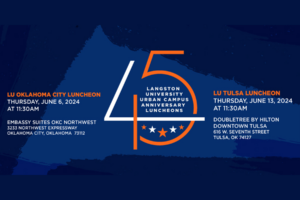
Tag: lu okc


LANGSTON UNIVERSITY AWARDED $4.375 MILLION NATIONAL GRANT FOR REHABILITATION RESEARCH CENTER
by Dr. Corey Moore, Founding Chair of the Department of Rehabilitation and Disability Studies
LANGSTON, Okla. – Langston University has been awarded a $4.375 million grant for its Rehabilitation Research and Training Center (RRTC) from the National Institute on Disability, Independent Living, and Rehabilitation Research (NDILRR).
The grant, which will total $4.375 million over 5 years, extends a third cycle of funding from the NDILRR Administration for Community Living which is intended to help minority-serving institutions build research capacity and study rehabilitation disparities. Dr. Corey Moore, the founding chair of the Department of Rehabilitation and Disability Studies at Langston, will serve as principal investigator and director for the grant.
“This national RRTC positions LU as the foremost national leader on the frontier of cutting-edge disability and rehabilitation research capacity building at minority-serving institutions and minority disability and rehabilitation research,” Dr. Moore said. “This center will provide Langston University a national avenue to mentor faculty members and students and provide technical assistance to research support systems to enhance scientific abilities and opportunities and access to federal research dollars at historically Black colleges and universities, Tribal colleges and universities, Hispanic-serving institutions and Asian American and Native American Pacific Islander-serving institutions.”
The award involves a consortium of researchers and mentors at the Institute for Community Inclusion at the University of Massachusetts Boston, the Kessler Foundation, and South Carolina State University. Other collaborators who will work with the LU-RRTC in carrying out activities include the Oklahoma Department of Rehabilitation Services, the Delaware Nation Vocational Rehabilitation Program and the Association of University Centers of Disabilities. The goal is to build minority-serving institutions’ disability and rehabilitation research capacity through research participation that examines the experiences and outcomes of people with disabilities from traditionally underserved populations, such as African Americans/Blacks, Native Americans or Alaska Natives, Latinx, and Asian Americans and Pacific Islanders.
One of the key studies will be carried out in partnership with the Institute for Community Inclusion at the University of Massachusetts Boston and will involve a mentorship component with a new institutional Research Capacity Building and Infrastructure Model. This model aims to build the disability and rehabilitation research skills of both faculty members and students as well as the institution’s overall capacity for research. The RRTC will match select minority-serving institutional faculty and students with peer mentors and will link institutional research support systems with key consultants to build the center’s capacity.
The RRTC will also work with providers such as the Oklahoma Department of Rehabilitation Services and the Delaware Nation Vocational Rehabilitation Program to assess the feasibility of a cultural competence in Employment Support Training Model for providers serving people with disabilities from traditionally underserved racial and ethnic populations with co-occurring opioid and/or substance use disorder.
“Langston University is proud to advance the NIDILRR’s mission of generating knowledge used to improve the lives of individuals with disabilities,” said Langston University Interim President Ruth Ray Jackson. “The RRTC advances our institutional focus on access and opportunity for all people.”
The RRTC’s grant fund coordinated, integrated and advanced programs of research, training, and information dissemination in topical areas specified by the NIDILRR. These centers conduct research to improve rehabilitation methodology and service delivery systems as well as improve health and functioning while also promoting employment, independent living, family support, and economic and social self-sufficiency for individuals with disabilities.
